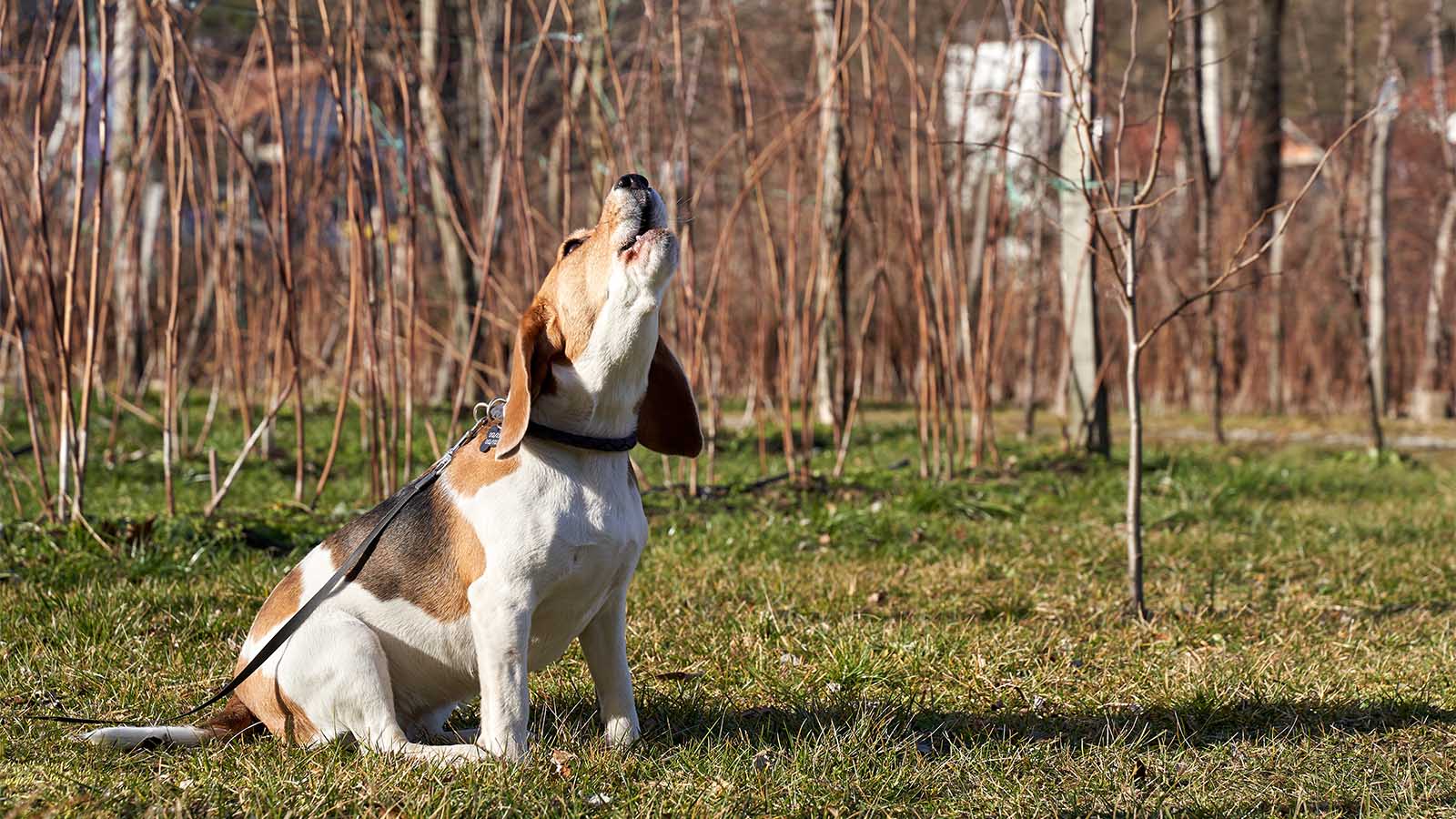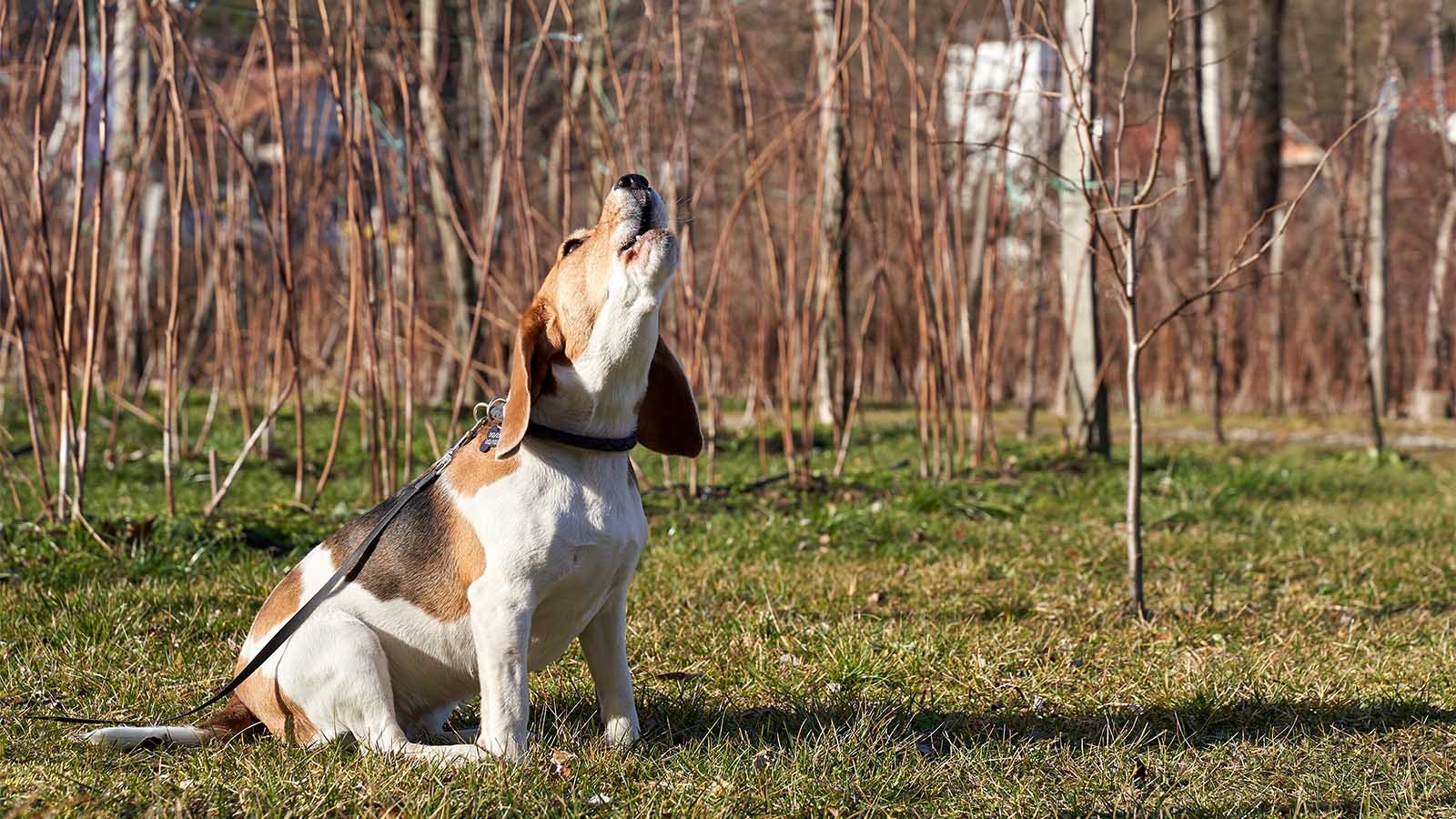Beagles, with their distinctive howl, are known for their vocal nature. Did you know that beagles have been selectively bred for centuries to have a strong sense of scent and the ability to communicate through howling? This unique characteristic is deeply rooted in their history as hunting dogs.
Beagles howl for various reasons. One of the main reasons is their innate instinct to communicate with their pack. Howling allows beagles to signal their location, gather the pack, and coordinate their activities. Additionally, beagles may howl out of boredom, anxiety, or in response to certain stimuli like sirens or other loud noises. Understanding the reasons behind their howling can help owners address their needs and provide appropriate training and enrichment to keep them happy and content.
Beagles howl for various reasons. It’s their way of communicating and expressing themselves. They might howl when they’re excited, anxious, or experiencing separation anxiety. Howling is also a natural behavior for hunting dogs like beagles, as it helps them communicate with their pack. Beagles might howl in response to sirens, other dogs, or even certain sounds. Understanding the reasons behind their howling can help you better address their needs and provide them with the appropriate care and attention.

Why Do Beagles Howl?
Beagles are known for their distinctive howl, which can be quite charming but also a little frustrating for their owners. If you have a beagle or are considering getting one, you may be wondering why these dogs howl so much. In this article, we will explore the reasons behind a beagle’s howling behavior, from their instinctual nature to their communication needs.
1. Instinctual Behavior
Beagles are a breed of scent hound, which means they have a strong instinct to follow scents and track down prey. Howling is a natural behavior for these dogs, as it helps them communicate with other members of their hunting pack. In the wild, beagles would use howling to alert their packmates of a potential prey sighting or to gather the pack together when scattered. Even though our domesticated beagles may not be hunting in the same way, this instinct to howl remains.
When a beagle howls, it is their way of expressing excitement, frustration, or simply connecting with their pack. It is deeply ingrained in their DNA, and while it may not always be convenient for us, it is an integral part of their nature.
2. Vocal Communication
Another reason why beagles howl is to communicate with humans and other animals. Beagles are social dogs and rely heavily on vocalization to express themselves. A beagle may howl to get your attention, to let you know they want something, or simply to communicate their emotions.
It’s essential to pay attention to the context in which your beagle is howling. Are they trying to get your attention because they need to go outside? Are they feeling anxious or scared? By observing their body language and understanding their vocalizations, you can decipher the meaning behind their howling.
3. Boredom and Loneliness
Beagles are energetic and social dogs. If they don’t receive adequate mental and physical stimulation, they can become bored and lonely, leading to excessive howling. Beagles thrive on companionship and may resort to howling as a way to express their frustration or seek attention when left alone for long periods.
To prevent boredom and loneliness, make sure to provide your beagle with plenty of exercise, playtime, and mental stimulation. A tired and mentally stimulated beagle is less likely to engage in excessive howling behaviors. Consider puzzle toys, obedience training, or interactive play to keep your beagle entertained and engaged.
4. Separation Anxiety
Separation anxiety is a common issue in beagles and can manifest in various ways, including excessive howling. Beagles are pack animals, and being left alone for extended periods can trigger anxiety and distress. Howling is one way for them to seek reassurance and comfort when separated from their family members.
If your beagle exhibits signs of separation anxiety, such as destructive behavior, excessive howling, or bathroom accidents when left alone, it’s crucial to address this issue. Gradual desensitization, crate training, and providing comfort items or interactive toys can help alleviate separation anxiety in beagles. Consulting a professional dog trainer or behaviorist may also be beneficial in managing this condition.
5. Attention-Seeking Behavior
Some beagles may howl as a way to grab attention or get what they want. If your beagle realizes that howling gets them the desired response, such as letting them outside, feeding them, or giving them treats, they may continue this behavior as an effective means of communication.
If your beagle howls to demand attention, it’s important not to reinforce this behavior. Instead of giving in to their demands when they howl, wait for a moment of silence and then reward them with attention or treats. By doing so, you teach them that quiet behavior is more likely to get them what they want, rather than excessive howling.
6. Health Issues
In some cases, excessive howling in beagles may be a sign of an underlying health issue. Beagles are prone to certain medical conditions, including thyroid problems, pain, or discomfort. If your beagle’s howling patterns change suddenly or they exhibit other symptoms such as lethargy, loss of appetite, or changes in behavior, it’s crucial to consult a veterinarian for a thorough examination.
Medical conditions can cause distress and discomfort, leading to changes in a beagle’s behavior, including excessive howling. By addressing any underlying health issues, you can help your beagle feel more comfortable and reduce their howling episodes.
7. Response to External Stimuli
Beagles have highly sensitive noses and ears, which can make them more reactive to external stimuli. They may howl in response to sirens, other dogs’ howls, or loud noises. Their keen senses pick up on these sounds, triggering a natural response to join in. Howling in response to external stimuli is often a beagle’s way of establishing their presence or communicating with others.
If your beagle’s howling is primarily triggered by specific sounds or stimuli, you can try to mitigate their response by creating a quiet and comforting environment. Closing windows, using white noise machines, or providing a safe space for your beagle during loud events can help reduce their howling in such situations.
8. Repetitive Behavior
Some beagles may engage in repetitive behaviors, including excessive howling, as a way to self-soothe or alleviate boredom. These behaviors can become habitual, and the more a beagle practices them, the more ingrained they become.
If your beagle has developed a habit of excessive howling, it’s essential to redirect their behavior. Provide them with alternative outlets for their energy and mental stimulation, such as interactive toys or obedience training. Consistency and positive reinforcement can help break the cycle of repetitive howling behaviors.
9. Breed Characteristics
Beagles are known for their vocal nature, and howling is a characteristic of the breed. It’s important to understand that some beagles are naturally more vocal than others. While you can work on minimizing excessive howling through training and proper care, it’s essential to recognize that a certain level of howling may be inherent to the breed.
10. Individual Personality
Just like humans, each beagle has their own unique personality and temperament. Some beagles may be more prone to howling due to their individual preferences or experiences. Factors such as their upbringing, socialization, and previous training can influence their howling behavior.
Understanding your beagle’s personality and providing them with the right environment, training, and socialization can help manage their howling tendencies. Every beagle is different, so it’s important to tailor your approach to their specific needs and preferences.
Beagle Howling: A Fascinating Part of Their Nature
While beagles’ howling behavior can be challenging at times, it’s important to remember that it is a natural part of their nature. Instead of trying to eliminate howling altogether, focus on understanding their needs and finding ways to manage and redirect their behavior. Through proper training, socialization, and fulfilling their physical and mental needs, you can help your beagle embrace their vocal nature while maintaining harmony in your home.
Do Beagles Howl More Than Other Breeds?
Beagles are known for their howling, but do they actually howl more than other dog breeds? Here’s a comparison of howling tendencies between beagles and some other popular dog breeds:
| Breed | Howling Tendency |
| Beagle | High |
| Husky | High |
| Bloodhound | High |
| Dachshund | Medium |
| Basset Hound | Medium |
| Golden Retriever | Low |
| Labrador Retriever | Low |
| German Shepherd | Low |
As seen in the table, beagles, along with huskies and bloodhounds, have a high tendency to howl compared to other dog breeds. This is primarily due to their genetic makeup and breed characteristics. While some other breeds like dachshunds and basset hounds may also have moderate howling tendencies, beagles remain one of the most vocal breeds.
It’s important to note that individual dogs within each breed may exhibit different levels of howling behavior. Factors such as training, socialization, and the environment in which the dog lives can also influence howling tendencies. Understanding your dog’s specific breed characteristics and personality will help you better manage and accommodate their howling behavior.
Key Takeaways – Why Do Beagles Howl?
Beagles are known for their howling behavior, which serves various purposes:
- Communication: Beagles howl to communicate with their owners or other animals.
- Attention-seeking: Howling can be a way for beagles to get attention when they want something.
- Loneliness or Separation Anxiety: Beagles may howl when they feel lonely or anxious when left alone.
- Instinctual Behavior: Howling is a natural instinct for beagles, as they are a hunting breed.
- Alerting: Beagles may howl to alert their owners of potential danger or intruders.
Frequently Asked Questions
Beagles are known for their distinct and melodious howl. If you have a beagle or are considering getting one, you may be curious about why they howl. In this FAQ, we’ll explore the reasons behind a beagle’s howling behavior and what it means.
1. What triggers a beagle to howl?
Beagles howl in response to various triggers. One common trigger is separation anxiety. When left alone, beagles may howl to vocalize their distress. Another trigger can be boredom or a lack of mental and physical stimulation. Beagles are an active breed, and without enough exercise and mental stimulation, they may resort to howling. Certain sounds, such as sirens or other dogs’ howls, can also provoke a beagle’s urge to howl.
It’s important to understand your beagle’s triggers for howling and address them accordingly. Providing ample exercise, mental enrichment, and comfort when they are alone can help reduce their howling behavior.
2. Do beagles howl to communicate?
Yes, beagles howl as a means of communication. They have a strong instinct to vocalize and use their howls to convey various messages. Beagles may howl to alert their owners to something out of the ordinary, such as a stranger approaching the house or a potential threat. They may also howl to express excitement or to seek attention. Howling is a natural form of communication for beagles, and they use it to express their needs and emotions.
It’s essential to pay attention to your beagle’s howling and understand the context in which they are howling. This can help you determine whether they are trying to communicate something specific or if it’s simply an expression of their natural behavior.
3. Can training reduce a beagle’s howling?
Yes, training can play a significant role in reducing a beagle’s howling. By teaching your beagle basic commands and providing them with mental stimulation through training exercises, you can redirect their attention and energy towards more constructive behaviors. Additionally, crate training can help alleviate separation anxiety, which is a common trigger for howling in beagles. Consistency, positive reinforcement, and patience are key when training a beagle to reduce their howling tendencies.
It’s important to note that some level of howling is normal for beagles, as it is ingrained in their breed characteristics. However, with proper training and reinforcement, you can manage and minimize excessive howling in your beagle.
4. Can health issues cause excessive howling in beagles?
Yes, certain health issues can contribute to excessive howling in beagles. Pain or discomfort can cause a beagle to howl as a way of expressing their distress. It’s important to monitor your beagle’s overall health and behavior and consult a veterinarian if you notice any changes or signs of discomfort. Common health issues that may lead to excessive howling include dental pain, ear infections, arthritis, or gastrointestinal problems.
If you suspect that your beagle’s howling is due to a health issue, it’s crucial to seek veterinary care. Identifying and addressing any underlying health problems can help alleviate their howling and ensure their well-being.
5. Is howling more common in beagles compared to other dog breeds?
Yes, howling is more common in beagles compared to other dog breeds. Beagles are known for their vocal nature and have a natural instinct to howl. This is rooted in their history as hunting dogs, where howling was used to communicate with hunting partners and signal their position. While all dogs have the capacity to howl, beagles often have a stronger inclination to do so. It’s important for beagle owners to understand and manage their dog’s howling behavior to ensure a harmonious living environment.
By providing proper training, mental stimulation, and addressing any underlying triggers or health issues, you can help maintain a healthy balance and minimize excessive howling in your beagle.

What Makes a Beagle Howl?
In summary, beagles howl for several reasons. One reason is that it’s in their nature as hound dogs to use howling as a form of communication. They may howl to let their owners know they need something or to alert them of something. Howling can also be a way for beagles to express their emotions, such as when they are feeling lonely or anxious.
Additionally, beagles may howl in response to certain sounds, such as sirens or other dogs’ barking. This is known as social howling, where they are joining in with the pack mentality. Overall, beagles howl as a way to communicate, express their emotions, and respond to environmental stimuli.
